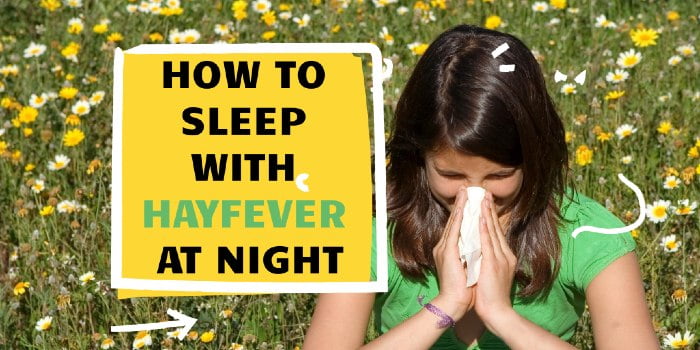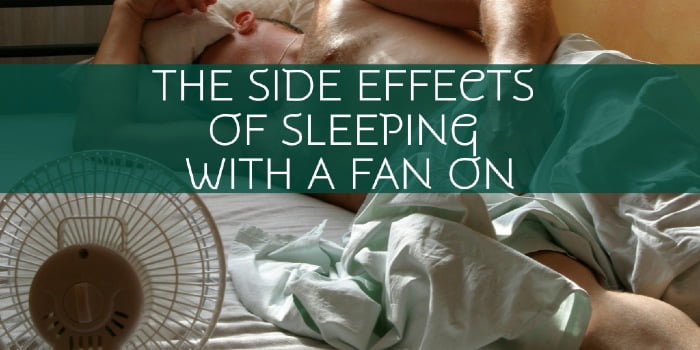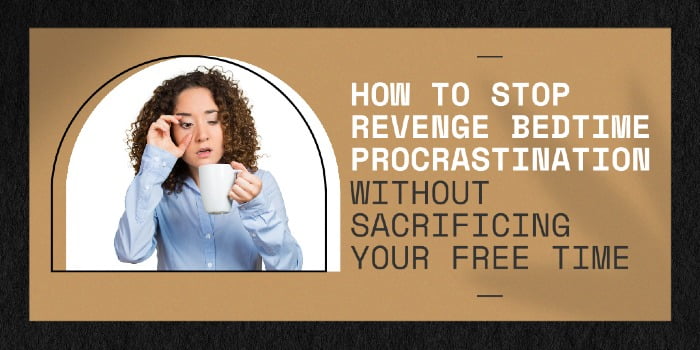There’s something amazing about finally seeing those long, warm, blue-skied days inside the UK. After particularly bad winters and endless rainy days, this weather is a breath of fresh air.
At least, it would be a breath of fresh air if it wasn’t for one thing: pollen. Yeah, pollen is great for flowers and bees, but for those with hayfever, they’re like little missiles designed to ruin your day. What’s more, the warmer and drier the weather is, the more of those tiny particulars will be in the air, and the worse your hayfever will be.
Once hayfever starts, it doesn’t just make the outside uncomfortable – but also disturbs your night and makes it difficult for you to get a decent sleep. But, there are tips that you can use to help ease your symptoms and catch up on your rest. And, lucky for you, we’re about to reveal them all in this guide of how to sleep with hayfever at night.
What causes hayfever?
Before we get into our top tips of how to sleep with hayfever at night, let’s dive into what causes hayfever and why it’s causing you to have such a terrible night’s sleep. Or if you’d rather save your itchy eyes the strain and just go straight to the tips, you can carry on scrolling past this section.
Hayfever is one of the most common allergies in the world. So common, in fact, that it will affect 1 in 5 people at some point in their lives. Sadly, there are those that are more prone than others and have come to hate the summer season for what it does to them.
Hayfever is an allergic reaction.
It’s caused by coming into contact with microscopic allergens, such as pollen that you can’t see. Because pollen count is highest between March and September, hay fever symptoms are at the worst during these months.
When your body comes into contact with these allergens, it acts like it’s being attacked by a virus. This means that it will release antibodies and put up all defences to fight it off – which is almost like you’re fighting a cold or an infection. These symptoms include:
- Sneezing and coughing;
- A runny or blocked nose;
- Itchy, red or watery eyes;
- A loss of smell;
- Feeling tired, or rundown;
- Itchy throat, mouth, nose and ears;
- Pain around your temples and forehead, including headaches or earaches.
If you suffer from asthma, you may also be short of breath, be weezey or have a tight chest.
Why does hayfever make it difficult to sleep?
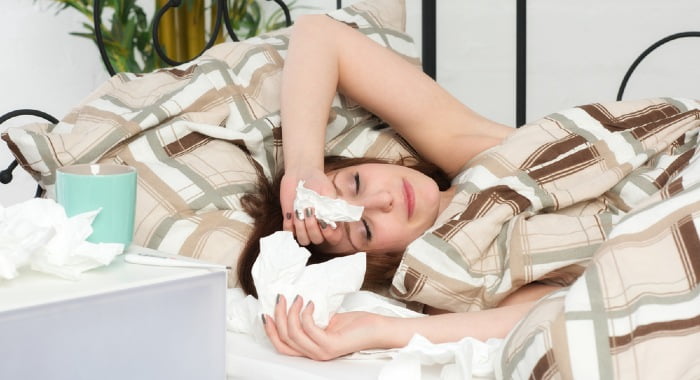
There are two main reasons that hayfever makes it difficult to sleep at night.
Firstly, hayfever interferes with your airways. It can give you a blocked nose, forcing you to use your mouth to breathe at night, which doesn’t let in as much oxygen.
To make matters worse, all the mucus can start to pool up at the back of your throat as you lay down, thanks to that pesky thing called gravity. This narrows your airways, meaning that you’re more likely to wake up to get some oxygen flowing back in or to clear your throat.
If you suffer from asthma or sleep apnea, hayfever can also make these symptoms worse and lower your quality of sleep by blocking your airways and making it more difficult for you to breathe during the night.
Secondly, hay fever symptoms are uncomfortable. Sleep is a very complex process and needs the optimum conditions at night for us to drift off. If you’re uncomfortable, you’re not going to be able to relax and drift off into a night of sleep.
How to sleep with hayfever at night
Although taking over the counter medication such as antihistamines can help reduce the symptoms of hayfever, for most sufferers they don’t eliminate the problem and only last for a short amount of time.
And unless you’re going to wrap yourself in a protective plastic ball while you’re outside, you’ll encounter more pollens and allergens which will reignite your symptoms.
So to help improve your sleep, we’ve rounded up the top tips of how to sleep with hayfever at night. Let’s begin, shall we?
1. Take a shower before bed
Pollen can gather on your skin, hair and clothes. So before you go to bed, it’s a good idea to take a shower and make sure that you’re not reinfecting yourself with any more pollen before getting into some fresh clothing.
Although having a bath before bed might work as part of a good sleep hygiene routine, we’d recommend sticking to a shower in the hayfever season. The running water will be better at getting rid of the pollen – while the warm steam can also help decongest your nose and breathe a little easier.
2. Change your outdoor clothing immediately
As we pointed out in tip #1, pollen can gather and stick to your clothes. So if you wear something and then come inside, you can be transferring the pollen to your furniture, bed, and more if you sit or lay in them with your outdoor clothes.
When you get into your house, immediately change out of your clothes and put a fresh pair on to try and avoid cross-contamination within your home.
The less point of contact you have between yourself and pollen, the better your symptoms will be. That means less pain, less irritation and more sleep.
3. Invest in hypoallergenic sheets – and wash them indoors
Hypoallergenic sheets are bed sheets that are made from materials such as bamboo fibre or wool that make it difficult for allergens such as dust mites to survive. They’re also usually good at temperature regulation, helping you to absorb moisture and keep your bed cool.
If you’re someone who sleeps hot, you may want to consider switching to hypoallergenic sheets and using a cooling mattress protector on top.
Hypoallergenic sheets and bedding can help recuse the symptoms of hayfever during the night. But to really make them work, you need to make sure that they’re regularly washed and dried indoors.
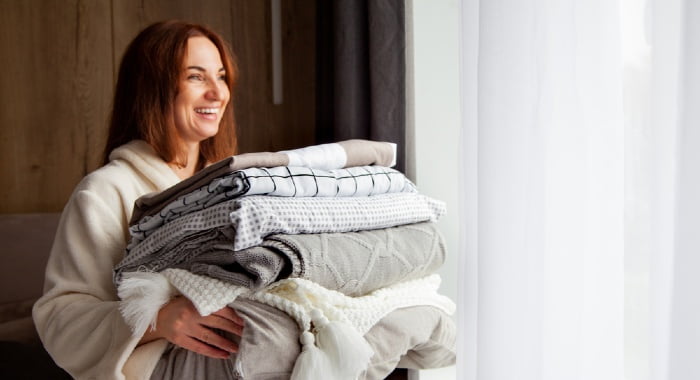
No matter how nice it is outside and quickly your washing will dry on the line, putting your sheets and clothing outside exposes your fabric to pollen. Some of the pollen will stick to your sheets, setting your hayfever off as soon as you climb into bed.
4. Time your antihistamines right
Antihistamines are over the counter medication that can be used to elevate the symptoms of hayfever. In most cases, you can only take one tablet per day, so the timing of this medication might be key to getting a better night’s sleep.
If you take it early on in the day, you’ll feel the most relief then. By the time it gets to night, the antihistamine would have well and truly worn off and your symptoms will be in full force. However, if you take your antihistamine closer to bedtime, you’ll feel the benefit when it’s time to go to sleep.
This can help you get more comfortable, expand your airways and dull your aches and pains enough to help you drift off. What’s more, a lot of antihistamines have a drowsy side effect, which can also be a bonus when you’re struggling to sleep.
5. Watch your foods
Your diet can have a big impact on your hayfever symptoms and sleep.
Certain foods, such as dairy or starchy foods can make your symptoms worse and thus have a knock-on effect on your sleep. In addition, foods and drinks that are high in caffeine or sugar can make you feel more awake and alert, preventing your body from producing the hormones it needs to sleep.
It’s not all bad though. Some foods, such as those high in vitamin E like eggs can help boost your immune system and prevent hayfever symptoms. In addition, eating spicy foods can also help unblock your nose and clear your sinuses, whereas the added vitamin C boost from garlic, ginger or chilli dished also help your body reduce inflammation.
6. Try using nasal sprays
Having a blocked or runny nose is the biggest sleep blocker for hayfever sufferers. So, using products like nasal sprays or decongestion relief before bed can help clear your airways. In turn, this will help decrease the number of times in the night you might wake up and make you a lot more comfortable to drift off to sleep.
Nasal sprays can be purchased over the counter, but you can always ask your pharmacist for advice or help to pick the right one for you.
7. Know when to get help
Hayfever is not fun. But if you’re suffering from intense or chronic symptoms, then you might need to visit your GP to see if there is any other medication that you can use to help.
Depending on your circumstances, they may be able to prescribe you a steroid treatment to reduce inflammation, or even refer you to immunotherapy. This is where you’re exposed to a small amount of pollen through an injection or tablet in order to build up immunity for it. It’s the same principle as taking a vaccine to help avoid a particular disease.
Need more sleep tips and advice?
At Sleep4Beginners, we’ve got all the sleep tips and advice you need to get your 8 hours of sleep and wake up feeling refreshed.
Whether you need tips on how to sleep during a heatwave, want to know if you are suffering from a common sleep disorder or are looking for your next mattress, we’ve got you covered.
Whatever your sleep needs, visit Sleep4Beginners.
